What is CBI
CBI is the acronym for Central Bureau of Investigation. CBI is considered as India's top investigative organisation. The Ministry of Personnel, Public Grievances, and Pensions has control over the organisation (India). CBI was initially created to probe cases of bribe and political or governmental corruption; it was enlarged in 1965 to examine violations of central laws executable by the Indian government, multi-state criminal organizations, multiple agencies, or international criminal acts.
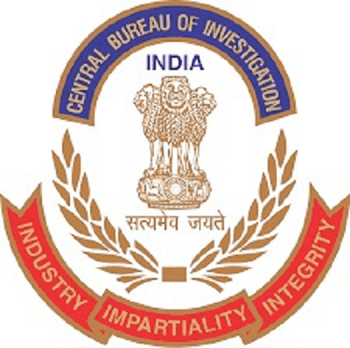
The organization has been recognized to examine or probe a range of economic offenses, special criminal activities, corruption charges, and other matters.
The CBI doesn’t come under the rules/terms of the Right to Information Act. The CBI is the country's formally recognised primary point of contact for Interpol interaction.
The CBI headquarters are at New Delhi's CGO Complex, near the Jawaharlal Nehru Stadium. As per the new reports of 2021, IPS officer Praveen Sinha of the 1988 batch of the Gujarat cadre would replace Rakesh Asthana as Special Director of CBI in 2021.
Between 2000 and 2021, he worked for the organization as superintendent of police, deputy inspector general, joint director, and additional director.
History
- The Bureau of Investigation can be traced back to the Special Police Establishment, which is a Central Government Police force established by the Indian government in the year 1941 to probe fraud, bribe, and corruption in money transfers with the War and Supply Department of India.
- CBI has its headquarter was stationed in Lahore.Qurban Ali Khan, the Superintendent of the SPE, who later no chose Pakistan after India's partition. Rai Sahib Karam Chand Jain was the War Department's first legal counsel.
- Just after the war, there was a requirement of a central government institution to examine bribe cases/ activities and corruption among central-government officials. It was decided that the DSPE's purview will be expanded to include all divisions of the Indian government. Soon its jurisdiction was expanded to Union Territories, but the state government's permission was required to extend its jurisdiction to the states.
- Chief of the Home Department and India's initial deputy prime minister, Sardar Patel, wanted to eliminate corruption in former princely states like Jodhpur, Rewa, and Tonk. Jain was tasked with monitoring criminal procedures against the dewans and chief ministers of those states.
- The DSPE was renamed the Central Bureau of Investigation (CBI) on January 1, 1963, by a Home Ministry resolution.
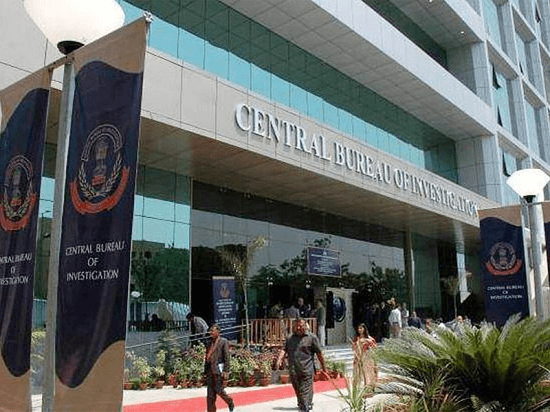
CBI Formulation
With its position as India's premier investigative organisation, the CBI was asked to help in serious and complicated criminal matters such as murder, kidnapping, and terrorism.
According to appeals made by oppressed individuals, the Supreme Court and several High Courts in the country started referring such serious cases to the CBI. According to its organisational chart from 1987, the CBI was sub-divided into six sections, including an anti-corruption unit, a special crime unit, an economic crimes unit, a policy and international police cooperation unit, an administration unit, a prosecution unit, and central forensic science labs.
Founding Director
In April 1963, D. P. Kohli was appointed as the CBI's establishing director. He retained the post until May 1968. Prior to this, Kohli handled law enforcement posts in Madhya Pradesh (as head of police) and Uttar Pradesh, as well as in the regional central government office. Kohli was honoured with the Padma Bhushan in 1967 for his meritorious service. A National Investigative Agency was Kohli's goal with the Special Police Establishment. His extended work as an inspector general and director established the framework for the bureau's growth.
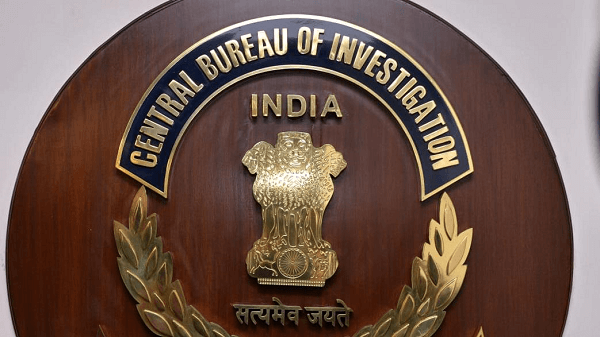
Organizational Chart - CBI or Central Bureau of Investigation
In addition to a Director, the CBI is led by an IPS officer who has the rank of Director General in the Police Department.
The director is appointed for a two-year term by a high-profile committee established under The Delhi Special Police Establishment (DSPE) Act, 1946, as modified by The Lokpal and Lokayuktas Act, 2013.
Special Director, Additional Director, Joint Director, Deputy Inspector General of Police, Senior Superintendent of Police, Superintendent of Police, Additional Superintendent of Police, and Deputy Superintendent of Police are other CBI ranks that may be employed by IRS (Indian Revenue Service) officers and IPS.
SSC recruits Inspector, Sub-Inspector, Asst. Sub-Inspector, Head Constable, and Constables from the police, income tax, and customs departments.
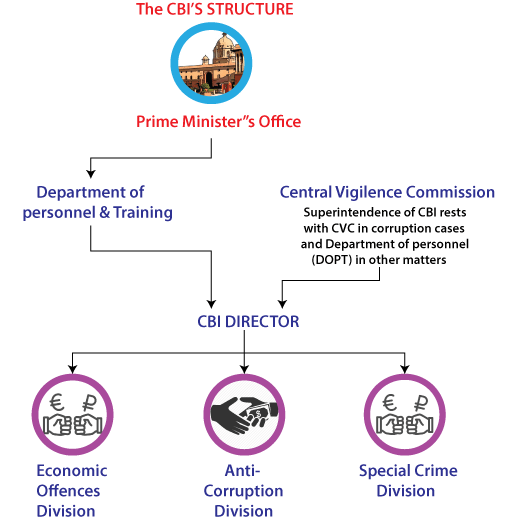
Constitution
On November 6, 2013, the Gauhati High Court ruled that the Central Bureau Of Investigation is unconstitutional and lacks legal standing.
However, when the national government disputed the ruling, the Supreme Court of India postponed it, and the next hearing was scheduled for December 6, 2013.
Some law analysts claim that the final solution for the Government of India is to draught a rule for the agency, as the Supreme Court may rule that the CBI's composition is unconstitutional eventually.
Call For More Power/Authority
The CBI demanded an autonomous enquiry, saying that while it delayed the power of the government in non-corruption matters, the director needed adequate financial and management powers (including at least the three-year time period to have "functional autonomy"). The organisation further said. "As such, it is essential that the director of the organisation should be endowed with ex-officio responsibilities as Secretary to the Indian Government, reporting straight to the minister without needing to go to the DoPT."Moreover, they said that in addition to finance powers, the organisation also needed a different budget.
Appointment and Selection
CBI Director is appointed by Appointment Committee on the proposal of Selection Committee for a tenure of atleast two years, according to DSPE Act 1946 as revised by Lokpal &Lokayukta Act 2013 and CVC Act 2003.
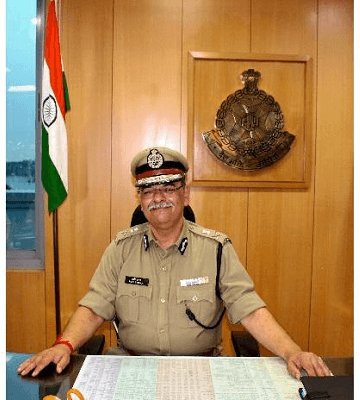
The members of the Appointment Committee include;
- PM or the Prime Minister, who is usually the Chairperson
- The head of the opposition party in Loksabha, or the leader or head of the largest opposition party in Loksabha, if the previous is absent owing to shortage of required capacity.
- The next important member includes the Chief Justice of India, or the Judge of Supreme Court of India as suggested by Chief Justice.
- The committee respects the outgoing director's opinions while providing suggestions.
One of the individuals nominated by the Selection Committee under the Delhi Special Police Establishment Act of 1946 is selected and appointed as CBI director by the Appointment Committee.
Coming to the Selection Committee, it usually comprises of Central Vigilance Commissioner as the Chairperson and Vigilance Commissioners, Secretary of Govt Of India – MHA or Secretary, Coordination, Public Grievances Cabinet Secretariat as the other essential members of the Committee.
On November 25, 2014, the NDA government introduced an amendment bill to do away with the necessity of quorum in noteworthy committees while nominating nominees for the position of director CBI to the national government. They put forward a clause stating that no appointment of the CBI director shall be deemed as invalid only on the reasons of vacancy or absenteeism of member in the panel. Also, it is important to note that as of 2019, Loksabha's LOP post is empty.
Building, Facilities, and Infrastructure
New Delhi's CBI headquarters is an 11-floored, 186 crore structure that houses all the bureau's divisions.
- In addition to a contemporary communication network, a sophisticated record-maintenance system, huge storage, and automated access control are also equipped in the building of the agency.
- There are interrogation rooms, cells, dorms, and conference halls available for use by the military and police.
- The staff cafeteria, gymnasium, terrace garden, and 470 parking spaces are available in the building's two-level basement.
- A press briefing room and media lounge are also available, along with modern fire management and power backup facilities.
- 1996 saw the opening of the CBI Academy in Ghaziabad, Uttar Pradesh.
- Nearby railway stations include New Delhi Railway Station and Indira Gandhi International Airport.
- With meadows and plantations covering a total of 26.5 acres (10.7 ha), the campus is home to administrational and academic facilities as well as a dormitory and housing areas.
Before the academy was created, short-term in-service training was held at the Lok Nayak Bhawan in New Delhi. CBI also depended on the state police training centers and the Sardar Vallabhbhai Patel National Police Academy in Hyderabad to provide fundamental training programs to deputy superintendents of police, sub-inspector, and constable positions. Proper and essential training for all CBI positions is met at the Academy.
Specialist courses are also offered to state and federal law enforcement officers as well as to members of the Indian military.
Jurisdiction, powers, and constraints
According to the Delhi Special Police Establishment (DSPE) Act 1946, the CBI has investigative authority, responsibilities, and also an obligation.
Depending on the agreement of the government of the state responsible, the federal government may expand the authority and purview of the CBI for inquiry to any area (excluding Union Territories).
CBI officers with the rank of sub-inspector or higher may be deemed police station supervisors.
According to the legislation, the CBI can only probe, enquire if the central government notifies it.

CBI and State Police- Relationship
In its initial state, the CBI was created under the Delhi Special Police Establishment Act to function within the city of Delhi only.
CBI requires prior permission from other state governments to undertake probes on their territory because policing and law are state responsibilities under Constitutional law.
Section 6 of the Delhi Special Police Establishment Act provides for a "general consent" that applies to all inquiries until it is cancelled, or a "particular consent" that applies to specific cases.
Soon after the permission, the Central Bureau Of Investigation can begin investigating economic cases, bribery, and certain offenses, even the ones that of national security, drugs, and narcotics, etc.
As a general rule, most states in India had given permission to the agency to probe crimes in their jurisdiction.
Many states have taken back their 'general approval' to the CBI's operation as of 2020. They must now obtain individual permission depending on case to case. Some of these states include Andhra Pradesh, Chhattisgarh, Rajasthan, Maharashtra, West Bengal, Punjab, and so on.
CBI and Courts of India
A five-judge Constitutional Bench of the Supreme Court ruled on 17 February 2010 that the High Courts and the Supreme Court have the power to issue or impose a CBI probe into a crime perpetrated in a state without the permission of the state
According to the bench, this Court and High Courts, as guardians of civil rights, have not only the authority and power but also the responsibility to preserve the fundamental rights, protected by Part III in general and by Article 21 of the Constitution in particular, with enthusiasm and vigour.
In its ruling, the court stressed that these are special powers that can only be utilisedin extreme situations.
The Supreme Court ruled in CBI vs. CBI that the selection committee had the authority to dismiss or suspend the director of CBI and not the national government. This was the ruling of the Supreme Court when the CBI Director challenged the central government's decision to send him on unpaid leave without his consent.
Right to Information and CBI
Information about CBI is not subject to the Right to Information Act's requirements.
For reasons of national security, the government exempted CBI and other similar organisations National Investigating Agency, Directorate General of Income Tax Investigation, and Natgrid on from rules of RTI. An un-conditional exemption was condemned by the Central Information Commission and RTI campaigners, who argued that it was in violation of the letter and purpose of the RTI Act. At the same time, the High Court of Madras has maintained the exclusion.
CBI and Cases
Numerous high-profile cases, including the murder of Bhanwari Devi and the Satyam scam, as well as the murder of Sister Abhaya and the INX Media case, were solved by the CBI.
A majority of CBI cases are highly sensitive and of national significance.
Cases under the jurisdiction of state police departments are routinely registered; if required, a case may be transferred to the CBI by the central government.
The organisation has been criticised for the way it handled various scams, which were handled improperly.
Apart from the credit of solving many high-profile cases, there have been many controversies and scams as well that have certainly questioned the performance and way of working of CBI.
Leaving all that apart, there are various important tasks and activities that are performed by CBI, like fighting against corruption, investigating and probing cases of national security, and eliminating bribery from the system.